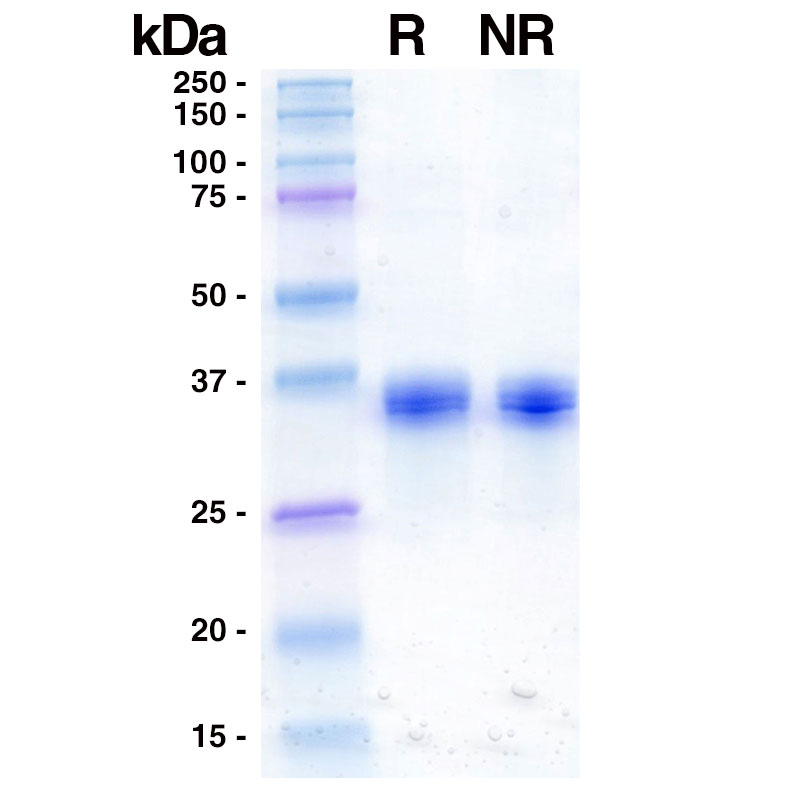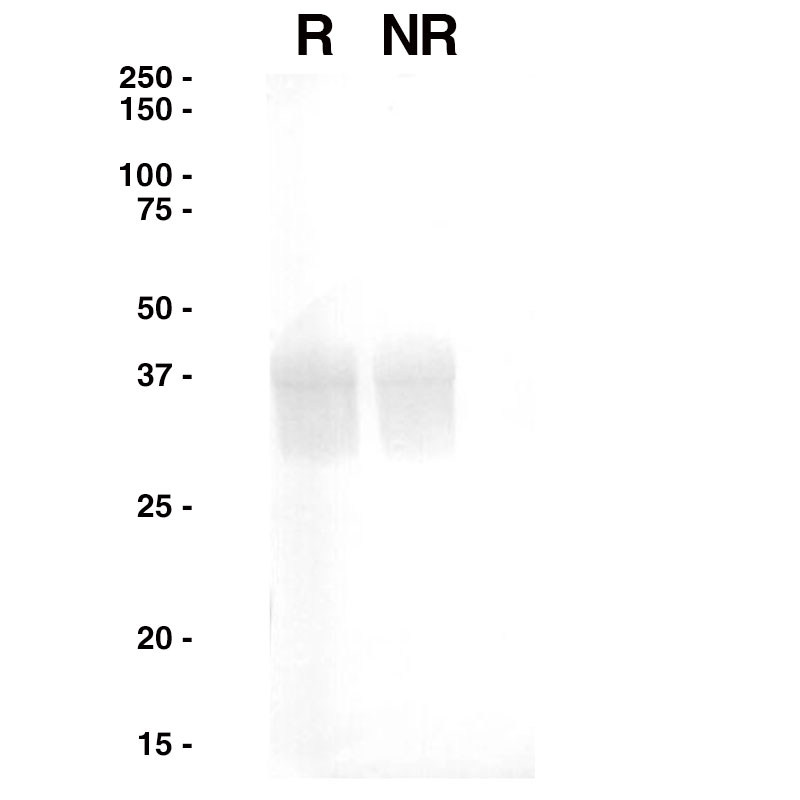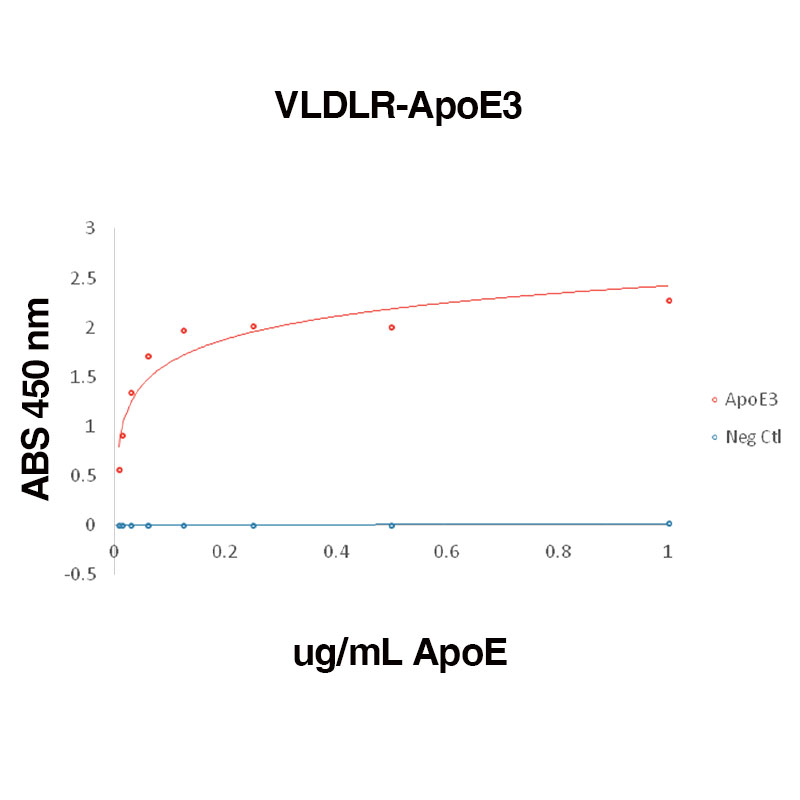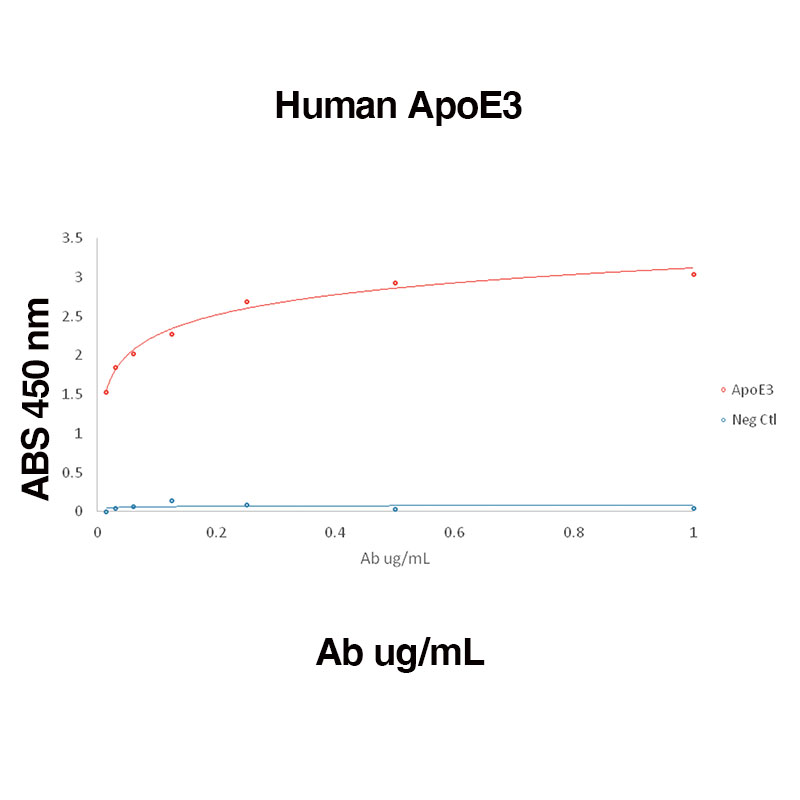Recombinant Human ApoE3
Data
 SDS-PAGE
SDS-PAGE
R: 5µg reduced Recombinant Human ApoE3 (Leinco Prod. No.: A120)
NR: 5µg non-reduced Recombinant Human ApoE3 (Leinco Prod. No.: A120)
 Western Blot
Western Blot
Purified recombinant Human ApoE3 (Leinco Prod. No.: A120) was separated on SDS-PAGE under both reducing and non-reducing conditions and probed with an anti-ApoE antibody.
 Functional binding of Recombinant Human VLDLR to Recombinant Human ApoE3 (Leinco Prod. No.: A120)
Functional binding of Recombinant Human VLDLR to Recombinant Human ApoE3 (Leinco Prod. No.: A120)
Binding was measured by ELISA. Recombinant Human VLDLR was immobilized at 1 µg/mL. Recombinant Human ApoE3 protein was titrated. Anti-ApoE antibody was used for detection.
 Direct binding of anti-ApoE antibody to Recombinant Human ApoE3 (Leinco Prod. No.: A120)
Direct binding of anti-ApoE antibody to Recombinant Human ApoE3 (Leinco Prod. No.: A120)
Binding was measured by ELISA. Recombinant Human ApoE3 was immobilized at 1 µg/mL. Anti-ApoE antibody was titrated.
- -
- -
BackgroundApolipoprotein E (ApoE) is a 299 amino acid protein, produced by the liver and circulating macrophages, that is a constituent of every plasma lipoprotein except the smallest low density lipoproteins (LDL). It is a key player in the recycling and redistribution of lipids and cholesterol. ApoE is a ligand with a high affinity for low density lipoprotein receptors (LDLR). It regulates the activity of enzymes that metabolize lipids and also make lipids soluble. Mice and humans that lack ApoE cannot remove excess lipoproteins from the plasma and have an increased risk of atherosclerosis. Defective binding of ApoE to its receptors will lead to accumulation of cholesterol-rich lipoprotein particles in the plasma; this is the cause of type III hyperlipoproteinemia. There are three main isoforms of ApoE all products of alleles at a single gene locus: E2 (Cys112, Cys158), E3 (Cys112, Arg158), and E4 (Arg112, Arg158). ApoE3 is the most common isoform and is present in 40-90% of the population. Protein DetailsSpecies Human Format Purified No Carrier Protein Purity ≥90% by SDS PAGE Endotoxin Level <1.0 EU/µg Biological Activity ELISA Binding Protein Accession No. P02649 Amino Acid Sequence MKVEQAVETEPEPELRQQTEWQSGQRWELALGRFWDYLRWVQTLSEQVQEELLSSQVTQELRALMDETMKELKAYKSELEEQLTPVAEETRARLSKELQAAQARLGADMEDVCGRLVQYRGEVQAMLGQSTEELRVRLASHLRKLRKRLLRDADDLQKRLAVYQAGAREGAERGLSAIRERLGPLVEQGRVRAATVGSLAGQPLQERAQAWGERLRARMEEMGSRTRDRLDEVKEQVAEVRAKLEEQAQQIRLQAEAFQARLKSWFEPLVEDMQRQWAGLVEKVQAAVGTSAAPVPSDNH State of Matter Lyophilized SDS-Page Molecular Weight 35 kDa Predicted Molecular Mass 34.4 kDa Formulation This lyophilized protein is 0.22 µm sterile filtered and lyophilized from 20 mM Sodium Phosphate, pH 7.8 + 0.5 mM DTT. Reconstitution Reconstitute at 0.1-1 mg/ml using filtered deionized water. Gently mix by vortexing and/or inversion until fully dissolved. Centrifuge if necessary. Storage and Stability This lyophilized protein is stable for twelve months when stored at -20°C to -70°C. After aseptic reconstitution, this protein may be stored for one month at 2°C to 8°C or for three months at -20°C to -70°C in a manual defrost freezer. Avoid Repeated Freeze Thaw Cycles. Country of Origin USA Shipping Ambient Ligand/Receptor Low-Density Lipoprotein Receptor (LDLR) Species Human Regulatory Status Research Use Only NCBI Gene Bank UniProt.org P02649 Applications and Recommended Usage ? (Quality Tested by Leinco) ELISA, WB, FA Technical ProtocolsCertificate of AnalysisIMPORTANT Use lot specific datasheet for all technical information pertaining to this recombinant protein. |


